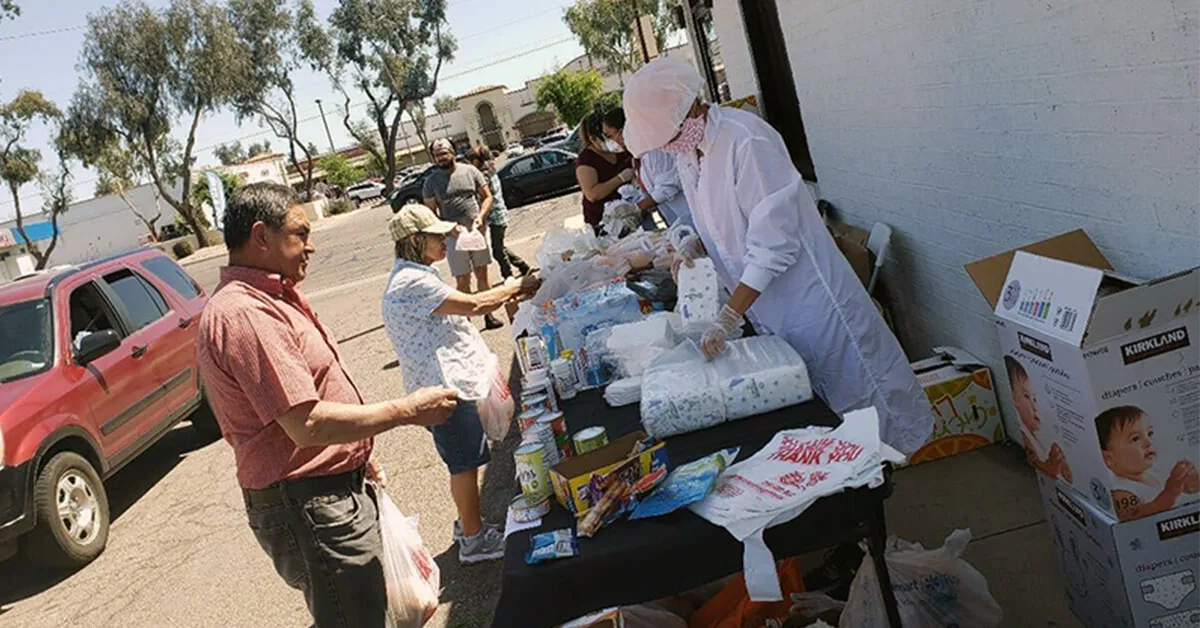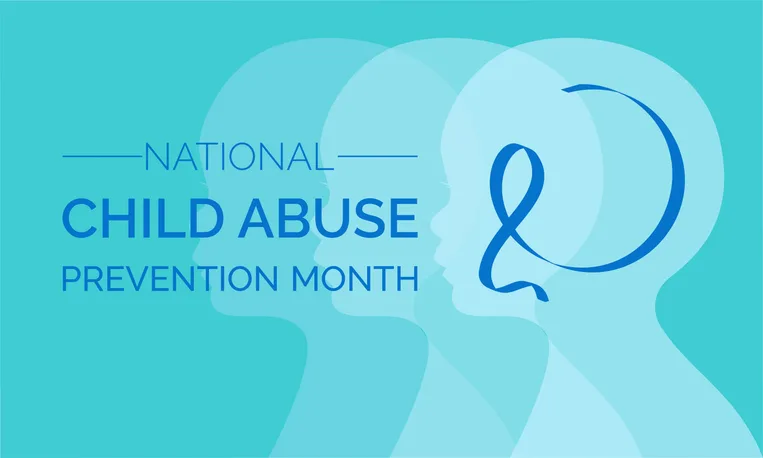
Photo courtesy of COVID Más Unidos que Nunca
Neighborhoods are organizing mutual aid collectives to provide needed relief not offered by state or federal agencies.
With grocery stores picked over by panicked shoppers and relief checks slow to arrive in mailboxes, Arizonans are coming together to provide relief to those in need.
The idea of sharing resources and services within a community, known as mutual aid, is not a new concept. When Hurricane Katrina hit Louisiana in 2005, community members formed the Common Ground Collective. Through this initiative, participants established seven community-run medical clinics, developed over 90 community gardens, and set up construction and legal services to help neighborhoods rebuild.
Hurting for help
Like the Common Ground Collective, mutual aid groups in Arizona have gained traction as a result of filling needs left unmet by the government during an emergency. In addition to the upcoming expiration of Pandemic Unemployment Insurance (PUA) funding, the state’s eviction moratorium, and a continued rise in cases of the coronavirus throughout Arizona, state and federal leaders have signaled that additional help isn’t coming anytime soon.
Gov. Doug Ducey has repeatedly avoided addressing the difficulties Arizonans have experienced in obtaining assistance, instead insisting that relief programs are available to those who need them.
RELATED: Gov. Ducey Follows Trump’s Lead, Continues to Open Business Despite COVID Increases
“Protections are in place. And we’re looking at this in the totality of where we are as a state, what’s happening with the federal and state packages,” said Ducey. “We don’t want to see anyone fall through the social safety net. And I would think our actions to date to stretch it and strengthen it should be evidence on how we want to protect Arizonans — and we’re getting better.”
But Arizona lagged behind in making aid available. The state’s PUA program, which offered benefits to workers not normally covered under regular unemployment, wasn’t launched until May 15, long after other states debuted their systems.
And those waiting for Pandemic Emergency Unemployment Compensation (PEUC) weren’t able to apply until June 7, meaning many people had gone months without any income.
Relief for renters has been similarly out-of-reach. Ducey announced in March that $5 million would be provided for rent assistance. Since then, less than 2,000 of the 17,000 applications for relief have been approved.
Taking cues from the top
Ducey’s handling of the coronavirus falls in-line with President Donald Trump’s approach to the pandemic, which a majority of Americans disapprove of.
Trump has famously refused to take responsibility for the crisis, downplayed the dangers of COVID-19, and tried to pass the buck to states for medical supply and equipment shortages. He has also taken a passive approach to offer support to states, considering federal support to be used only as “backup.”
RELATED: ‘Quarantined in Trump’s Pocket’: McSally Criticized for Coronavirus Response Failures
Trump’s designation of the federal government as the “backup” will certainly rub states the wrong way, as it more or less betrays the entire point of the federal government. It also ignores the fact that Trump is the only one who can invoke the Defense Production Act to compel private companies to produce desperately needed medical equipment and supplies. The “backup” approach has resulted in states like Arizona experiencing delays in receiving necessary medical supplies and coronavirus test kits.
To fill the gap left by the government’s stunted response, mutual aid groups have been cropping up throughout the Phoenix area as residents struggle to find help during the coronavirus pandemic.
Mutual aid comes to the desert
Harrenson Gorman is a co-founder of Desert Indigenous Collective, a group begun amid the rise of the novel coronavirus. Its members provide food and cleaning supplies across Phoenix with a focus on helping the elderly, homeless, marginalized, and immunocompromised.
Gorman, who is Diné – the name Navajo people call themselves – wanted to develop a support system after seeing the insecurity brought on by COVID-19, the disease caused by the coronavirus. Looking for a way to help, he noticed groups in other states that are taking a different approach to community wellness: mutual aid networks.
The Navajo Nation has the highest per capita rate of COVID-19 cases in the country compared with individual states. As of June 29, there were 7,532 cases and 363 deaths among the 173,000 people who live on the reservation.
The numbers were not lost on Gorman. “We developed our collective in hopes of providing a system of support for one another,” he said.
RELATED: Grocery Delivery, Donation Boxes, And Free Meals: How Neighbors Are Helping Neighbors
The collective comprises a core group of about seven individuals who shop and then sanitize, make care packages and sanitize again, make deliveries or drop-offs, and then sanitize once more.
Since March, Desert Indigenous Collective has helped about 15 families in the Phoenix area with items ranging from pet food to paper towels. Those who request assistance receive supplies in bulk intended to last up to two weeks. The work is almost entirely funded by online donations and community support, with some funding coming directly from collective members, who balance this work with full-time jobs.
Coordinating previous efforts
In the absence of readily-available public aid, many have instead leaned on their neighbors for support, leading to the creation of several mutual aid groups similar to the Desert Indigenous Collective.
Other resources in Arizona include Mutual Aid Phoenix, which aims to help underserved individuals through the sharing and redistribution of resources. It was created to be a formal reflection of what was already happening within communities, said Parris Wallace, director of Black Phoenix Organizing Collective and a founder of Mutual Aid Phoenix.
“Historically speaking, we have always taken care of one another,” Wallace said. “When this pandemic happened, the effort became more coordinated.”
RELATED: The Hell That Is Trying to Get an Unemployment Extension in Arizona
Mutual Aid Phoenix, which launched in March, has helped about 50 families with such essentials as food, water, and cleaning supplies, Wallace said. It now has nearly 4,000 followers on Instagram.
“Mutual aid, as a practice, is not charity,” Wallace said. “Taking care of one another and making sure no one goes without, that’s what we’ve rooted ourselves in.”
Mutual Aid Phoenix and Desert Indigenous Collective started in response to the COVID-19 pandemic, but some existing groups are ramping up activities as well.
Expanding to meet needs
“De Mujer a Mujer” is a Phoenix radio show that has helped provide food and clothing to low-income people for the past five years. Founder Naye Olvera expanded those efforts three months ago to provide COVID-19 relief.
Donation options include helping with groceries or rent payments. De Mujer a Mujer has helped almost 1,700 individuals with food donations, and 10 families received rent assistance.
“A lot of people have been out of work, and now that the kids are home all day, it gets a little bit more expensive for the parents,” Olvera said. “It’s really hard for the families to pay rent.”
RELATED: What Could Happen When Arizona’s Eviction Moratorium Ends This Month
James Carlson, who has been a social worker in Arizona hospitals for the past five years, said some marginalized communities, like those experiencing homelessness, often benefit the most from community support.
“If a patient or client is worried about … where they’re going to have a safe place to lay their head at night, I think social justice precautions kind of go to the wayside,” he said.
It is encouraging, he said, to see people band together to invest time and resources into those most in need.
“Community buy-in right now is huge,” Carlson said, “because we’re in the middle of a pandemic that affects all of us.”
CONTINUE READING: Family Says Dad Would Still Be Alive If Casino Hadn’t Reopened
Politics

6 terrifying things that could happen if the Comstock Act is used to target abortion
Does 1873 sound like a really, really long time ago? Well, that’s because it is—but if Republicans and far-right anti-abortion activists have their...

He said what? 10 things to know about RFK Jr.
The Kennedy family has long been considered “Democratic royalty.” But Robert F. Kennedy, Jr.—son of Robert F. Kennedy, who was assassinated while...
Local News

Opinion: Strategies for Child Abuse Prevention
11 ways you can be an ally in the fight against child abuse. April is Child Abuse Prevention Month. In the United States, it is estimated that a...

Biden marks Earth Day by announcing $7 billion in solar grants
The Biden administration on Monday announced the recipients of its Solar For All Program, a $7 billion climate program that aims to lower energy...




